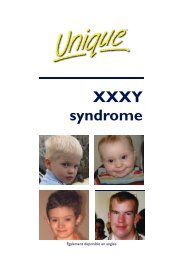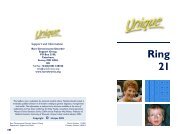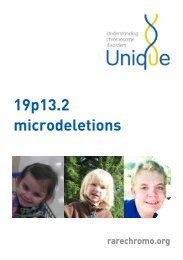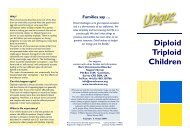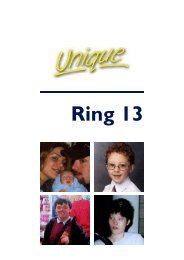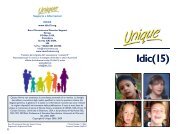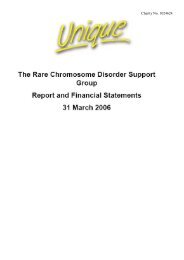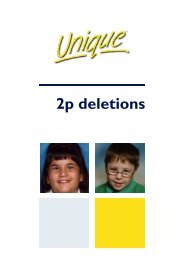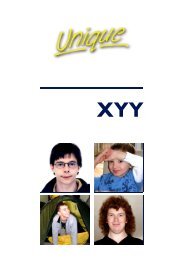18p deletions FTNW - Unique - The Rare Chromosome Disorder ...
18p deletions FTNW - Unique - The Rare Chromosome Disorder ...
18p deletions FTNW - Unique - The Rare Chromosome Disorder ...
You also want an ePaper? Increase the reach of your titles
YUMPU automatically turns print PDFs into web optimized ePapers that Google loves.
• Eyelids and vision<br />
Vision problems are common in <strong>18p</strong>-, with around 80 per cent of <strong>Unique</strong> children<br />
surveyed affected in one way or another. <strong>The</strong> most common feature was a squint<br />
(strabismus) affecting almost half of children. Another common problem is long sight<br />
which affects around a third of all children. Short sight has also been reported.<br />
Both long and short sight can be corrected with glasses (<strong>Unique</strong>).<br />
A number of children have an inability to open the eyelids fully (ptosis). Both eyes are<br />
often affected and this is evident at birth and does not develop later. This can cause<br />
problems with vision with the eyelid covering the eye and reducing vision.<br />
If necessary, ptosis can be corrected by a surgical procedure. Several children known to<br />
<strong>Unique</strong> have undergone surgical correction for ptosis, all with positive outcomes.<br />
One girl has double elevator palsy: her eyeballs cannot roll upwards (Turleau 2008,<br />
<strong>Unique</strong>).<br />
• Ears<br />
Babies and children with <strong>18p</strong>– may have more frequent ear infections than other<br />
children. <strong>The</strong>se can sometimes lead to a build up of fluid in the middle ear, called glue<br />
ear, which affected forty per cent of those surveyed by <strong>Unique</strong>. Glue ear usually resolves<br />
as children get older and the ear tubes widen and become more vertical resulting in<br />
improved drainage of the middle ear. <strong>The</strong>refore, any hearing loss caused by glue ear is<br />
usually temporary. However, persistent fluid in the middle ear and glue ear can reduce a<br />
child's hearing at a time that is critical for speech and language development. <strong>The</strong>refore,<br />
while glue ear persists, many children will need a grommet<br />
(a small ventilation tube) inserted into the eardrum (<strong>Unique</strong>).<br />
• Feet<br />
<strong>The</strong> feet of babies with <strong>18p</strong>- are sometimes not perfectly formed. Almost half of those<br />
who took part in the <strong>Unique</strong><br />
survey had some sort of foot<br />
anomaly. Feet may be small,<br />
with overlapping toes or a<br />
wide gap between the 1 st and<br />
2 nd toe. A small minority of<br />
babies are born with club foot<br />
(talipes equinovarus) where<br />
the foot is at an unusual<br />
angle. Other children have<br />
flat feet. Some children will<br />
need special, supportive<br />
special footwear or, more<br />
rarely, surgery and the<br />
difficulties may delay the age<br />
at which children learn to<br />
walk (<strong>Unique</strong>).<br />
15 years<br />
14



